#battle of crete
Explore tagged Tumblr posts
Text

German paratrooper on Junkers troop carrier before takeoff for the invasion of Crete. Developed from a roll of film taken from a German paratrooper killed on Crete.
22 notes
·
View notes
Text
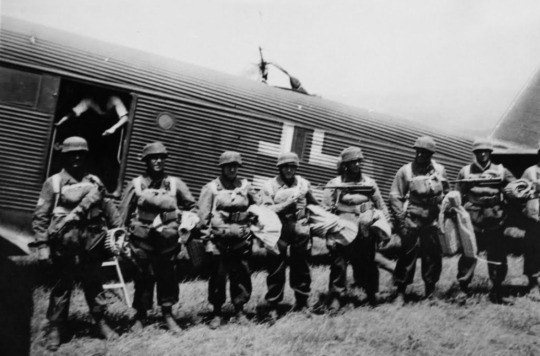
German paratroopers pose for a last photograph as they get ready to embark on Operation Mercury 20 May 1941 Credit : @justforbooks
#world war two#1940s#worldwar2photos#history#ww2#wwii#ww2 history#wwii era#world war 2#ww2history#aviation#luftwaffe#fallschirmjäger#paratroopers#Crete#1941#greece#battle of Crete#operation mercury
125 notes
·
View notes
Text

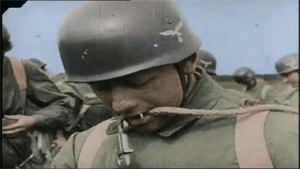
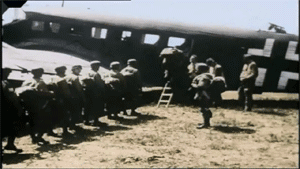
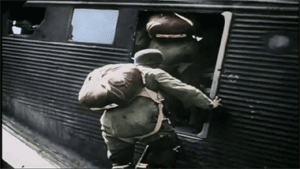

Embarquement des parachutistes allemands de la 7e Division aérienne (1ère division parachutiste en 1943) pour l'Opération Mercury - Bataille de Crète - Campagne de la Méditerranée - 20 mai 1941
#WWII#campagne de la méditerranée#campaign of the mediterranean#bataille de crète#battle of crete#luftwaffe#7e Division aérienne#7th Air Division#1ère Division parachutiste#1st Parachute Division#parachutistes#paratroopers#fallschirmjäger#crète#crete#20/05/1941#05/1941#1941
70 notes
·
View notes
Text
Remember the Battle of Crete: May 1941.
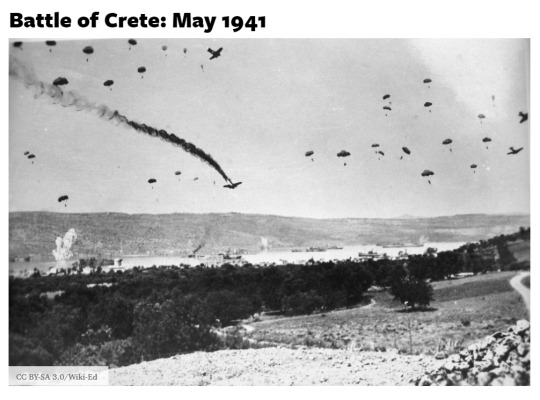
One of the most audacious operations in the German conquest of Europe was the air assault on the Greek island of Crete, the first action in which paratroopers were dropped in large numbers. Crete was defended by British and Greek forces who had some success against the lightly armed German soldiers jumping out of the sky.
However, delays and communication failures between Allies allowed the Germans to capture the vital airfield at Maleme and fly in reinforcements. Once the Nazis gained air superiority, landings by sea followed.
The Allies surrendered after two weeks of fighting.
[Read Up: Why the Tuskegee Airmen Were So Badass]
#Battle of Crete#chronology#second world war#military soldiers#german army#German soldiers#airfield#air assaults#German conquest of Europe#Year 1941
0 notes
Text

Scar and jewels practice with Helenus inspired somewhat by this line in Dictys of Crete:
>> Helenus was rewarded with the sons of Hector, whom Neoptolemus gave him, and with all the gold and silver which the rest of our leaders felt they should give him.
Sounds like someone is feeling guilty and just giving the poor man another jewel whenever they feel an emotion.
The clay necklace he is touching is also based off the cylindrical clay seals that function as signatures for both the men and women of Troy. Helenus is collecting what is left of his brothers.
#tagamemnon#greek mythology#classics#trojan heroes#ancient greek mythology#helenus#trojan war#the iliad#post the fall of troy#prophet of apollo#dictis of crete#helenus of troy#jewels ans scars#tw: battle scars
10 notes
·
View notes
Text
Auuaghh undertale fandom video essays my beloathed. Is it really so much to ask for just one (1) of these to be made by an actual fan who was in the fandom? Like it is so clear they are talking about it from an outside perspective or that they got into it just fpr the video and uggh. Where is the love? The appreciation for the aus and their creators? For the history for the fandom? Honestly I just want like a text post of someone saying 'hey remember those times? They were wild and they may not have been perfect but we sure had a lot of fun'.
#Undertale#Sorry I was watching a video essay about undertale fandom and I couldn't even finish it and it's just 30min long#They didn't even credit the authors!!!#'someone creted ink!sans' ywah no shit he sure didn't appear from the ether complete (😔 F in the chat)#'someon created error!sans in response' I'm... Pretty sure not? Been a while since I read loverofpiggies comics but Ink wasn't featured#In those at all. So#That was just a connection the fans did#Saying they haven't finished hanfdplates because the dub isn't caught up when you are explicitly reading it for research is... Well#And then they have the nerve to say that underverse was made/collaborated by Camila Cuevas and not even mention Jael Peñaloza?#While putting clips from her animations with the very clear sidebars saying Jael????#Tell me you didn't put a real effort into getting to know the fandom without saying it outloud good god#I'm not saying that a good analysis and outlook of the fandom can't be done from an outside perspective - look at supereyepatxhwerewolf's#Video for a very good example#But it just kind of hurts seeing something I love so much being treated so poorly#I get it. It's a lot. Doesn't mean that each au deserves its own care and attention and appreciation#Also he sucked ass at explaining he spent like 10min in one au and then just mentioned by bare name a ton others#And treated so badly ask blogs#Not shoqing the askblogs posts of the au and just the fanmade battle bcs then I would just be showing squares with text#Coward#Rant over sorry#mine
3 notes
·
View notes
Text
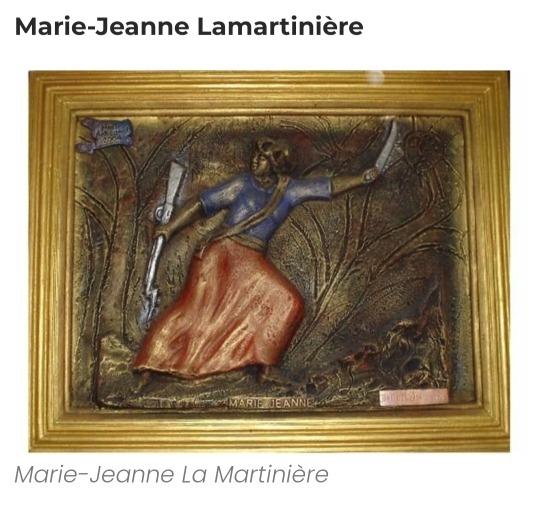
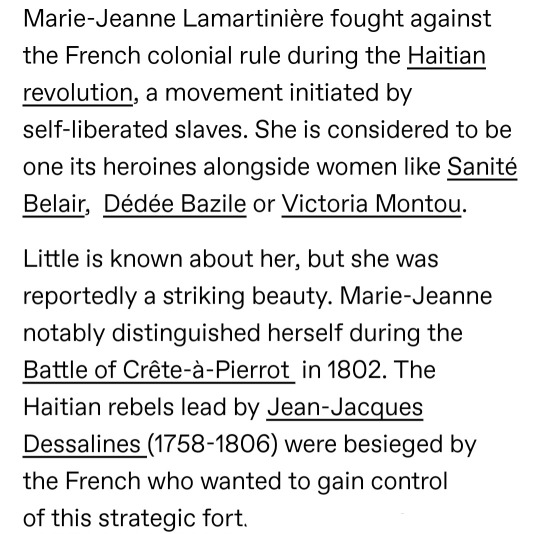
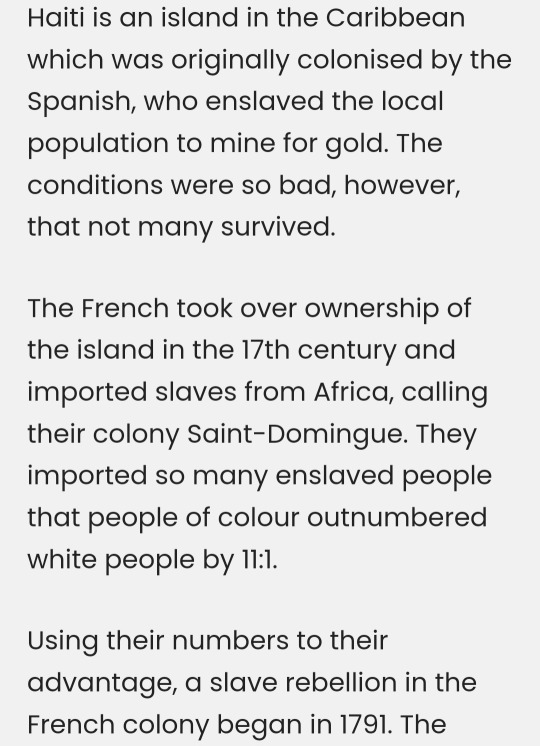
rebels were lead by Toussaint L'Ouverture, a self-freed Haitian general. It impacted the island on a large

3 notes
·
View notes
Note
hey bae I actually adore your writing!! Could you do something fluffy with Arthur tv and fem!reader where she’s rambling to him about like Greek mythology or smth random whilst sat in his lap and he’s just playing with her hair and listening? And she stops bcs she’s usually quiet and she feels bad for rambling but he reassures her bcs he’s genuinely so interested in everything she’s saying? Or something like that obviously adjust it to your preferences! Thank uu :)
Whispers of Olympus
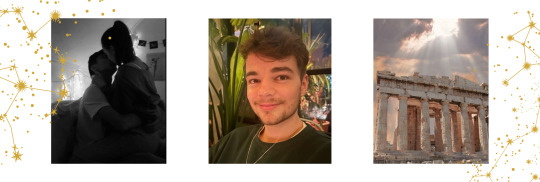
arthur frederick x fem!reader
summary: during a rambling about greek mythology you and arthur reach a profound, mutual realization.
warnings: greek mythology, mythological violence, emotional intensity
note: i absolutely loved writing this!!! i got a bit carried away but writing this caused my inner percy jackson kid to come out as someone who’s obsessed with greek mythology. once i started writing i couldn’t stop I spent 6 hours straight just putting all my ideas on paper! this filled me with so much joy you have no idea. i did put my own little spin on the ending. hope this is what you were looking for!
4.6k words
₊ ˚ ˚ ₊ ‧ 。☆ 。‧₊ ˚ ˚ ₊ ‧ 。☆ 。‧₊ ˚ ˚ ₊ ‧ 。☆ 。‧₊ ˚ ˚ ₊
In the soothing cocoon of your shared living room, with the soft hum of the city outside and the dim light from the television casting flickering shadows around, you found yourself in a familiar, cherished position: nestled comfortably in Arthur's lap, your back against his chest as you recounted tales of Greek mythology with animated enthusiasm. Your hands moved expressively, painting pictures of epic battles and divine machinations as you delved into the ancient stories that captivated you so deeply.
Arthur's fingers gently combed through your soft hair as you nestled comfortably in his lap, your eyes alight with enthusiasm. The warm afternoon sunlight streamed through the window, casting a golden glow over them both as you regaled him with tales of gods and heroes.
"...and then Theseus sailed to Crete to face the Minotaur," you continued, gesticulating animatedly. "Can you imagine how terrifying that must have been? A massive labyrinth filled with deadly traps, and at the center, a monstrous bull-man waiting to devour you!"
Arthur smiled softly, completely enraptured by your passion. He loved the way your eyes sparkled when you spoke of mythology, how your voice took on a lilting, storyteller's cadence. Though typically reserved, in moments like these you fully blossomed, painting vivid pictures with your words.
"But Ariadne gave him a ball of thread to find his way back out," you went on. "It's called Ariadne's thread, and it's become a metaphor for solving problems with logic. Isn't that fascinating? How these ancient stories still resonate today and shape our language and thinking?"
Arthur nodded, his fingers still gently combing through your hair. "It is fascinating," he agreed softly. "Tell me more about Ariadne. What happened to her after she helped Theseus?"
You shifted slightly in his lap, her eyes lighting up even more at his question. "Oh, that's where it gets really interesting! You see, after Theseus defeated the Minotaur, he took Ariadne with him when he left Crete. But then..." Paused dramatically, your hand resting on Arthur's chest. "He abandoned her on the island of Naxos while she slept!"
Arthur's brow furrowed. "That seems rather ungrateful of him," he murmured, his hand moving to trace gentle patterns on your back.
"It was!" you exclaimed. "But here's where it gets better. The god Dionysus found her there, fell in love with her, and made her his immortal wife. He even placed her crown in the sky as the constellation Corona Borealis."
As you spoke, Arthur found himself imagining the scene, picturing the lonely goddess on that distant shore, her heartbreak transforming into divine love. He gazed down at the woman in his arms, marveling at how she brought these ancient tales to life with such vivid detail.
"It's a bittersweet story," he mused, "but I suppose it worked out for Ariadne in the end."
You nodded eagerly. "Exactly! And there are so many interpretations of what it all means. Some say it represents the transition from maiden to wife, or the union of mortal and divine. Others see it as a cautionary tale about trusting strangers."
As you continued to expound on the various scholarly debates surrounding the myth, Arthur found himself captivated not just by the story, but by the infectious enthusiasm. Your cheeks were flushed with excitement, hands gesticulating wildly as you spoke. He loved how you could lose herself so completely in these tales, how the usual shyness melted away when you got caught in a passionate rambling.
"Oh! And did you know that the Minotaur itself is a fascinating symbol?" you asked, barely pausing for breath. "Some interpret it as representing the bestial nature within humanity, or the struggle between civilization and our primal instincts."
Arthur listened intently, his fingers still absently stroking you hair. He loved how your mind worked, connecting disparate ideas and finding meaning in the smallest details. As you spoke, he found himself drawn into her world of myth and symbolism.
"That's fascinating," he murmured. "It reminds me a bit of the story of Cronus. Do you know that one?"
Your eyes lit up even brighter. "Oh yes! Cronus, the Titan who devoured his own children. That's another myth with so many layers of meaning."
You shifted in his lap, turning to face him more fully, hands coming to rest on his shoulders. "Cronus ate his children because he feared they would overthrow him, just as he had overthrown his own father, Uranus. It's a story about the cyclical nature of time and power, and the fear of being replaced. But Rhea, his wife, she was cunning. She managed to trick him by wrapping a stone in swaddling clothes instead of baby Zeus," you explained, your voice lively with the thrill of storytelling.
Arthur nodded, his hand moving to cup your cheek gently. "And in the end, his fear became a self-fulfilling prophecy, didn't it? Because Zeus, the child he failed to eat, was the one who ultimately dethroned him."
"Exactly!" you exclaimed, her eyes shining with excitement. "It's a perfect example of how these myths often contain deep psychological truths. Cronus's attempt to cling to power ultimately led to his downfall."
Pausing for a moment, your brow furrowing in thought. "You know, there's an interesting parallel between the Cronus myth and the story of Oedipus. Both involve prophecies of sons overthrowing their fathers, and both show how attempts to avoid fate often lead directly to it."
"Oh! And speaking of Zeus, there was this time when he transformed into a swan to seduce Leda... it’s such a bizarre yet fascinating tale, showing just how far the gods would go for love—or lust," you chuckled, your eyes sparkling with amusement.
Arthur's chuckle rumbled in his chest, a warm sound that vibrated against your back. "The gods really didn’t have any limits, did they?" he mused, his intrigue palpable in his tone.
You nodded, pleased with his interest, and continued, "Not at all. Their stories are filled with such raw emotions and dramatic plots. Like the story of Persephone and Hades, this tale is one of my absolute favourites!" you exclaimed, your eyes lighting up with renewed excitement. "It's a story of love, loss, and the changing of seasons."
Arthur's hand continued its gentle ministrations in your hair, his fingers weaving through the strands as he listened intently. "Tell me about it," he encouraged softly, his eyes never leaving your animated face.
You shifted slightly in his lap once again, getting comfortable as you prepared to dive into the story. "Well, Persephone was the daughter of Demeter, the goddess of harvest and fertility. She was a beautiful young goddess, and Hades, the god of the underworld, fell deeply in love with her."
As you spoke, Arthur's free hand began tracing more lazy patterns on your back, his touch soothing and warm. You leaned into him, drawing comfort from his presence as you continued your tale.
"Hades was so smitten that he decided to abduct Persephone and take her to the underworld. He burst through the earth in his chariot, snatched her up, and disappeared back into the depths before anyone could stop him."
Arthur's brow furrowed slightly at the mention of abduction. "That seems rather drastic," he murmured, his hand stilling momentarily in your hair.
You nodded emphatically. "Oh, it was! Demeter was absolutely distraught when she discovered her daughter was missing. She searched the earth for nine days and nights, neglecting her duties as the goddess of harvest. As a result, the earth began to wither and die."
Your hands moved expressively as you spoke, painting pictures in the air. "Can you imagine the desperation she must have felt? A mother searching endlessly for her child, while the world around her fell into ruin?"
Arthur's expression softened, his fingers resuming its movements now running gentle caress through your hair. "It must have been heartbreaking for her," he said softly.
"It was," you agreed, your voice taking on a more somber tone. "Eventually, Zeus had to intervene. He commanded Hades to return Persephone to the world above."
You paused dramatically, your eyes meeting Arthur's. "But there was a catch. You see, Persephone had eaten six pomegranate seeds while in the underworld.
"And eating food from the underworld meant she was bound to return there," Arthur guessed, his voice soft with understanding.
You nodded enthusiastically, your eyes bright. "Exactly! For each seed she ate, she had to spend one month of the year in the underworld. So, for six months, she stays with Hades, and for six months, she returns to the world above with her mother."
As you spoke, you realized how long you had been talking, how many stories you had shared. A flush crept up your cheeks, and you suddenly felt self-conscious. "Oh," you said, your voice dropping to a whisper. "I'm sorry, I've been rambling on for so long. I didn't mean to bore you with all these old stories."
You started to pull away, but Arthur's arms tightened around you, holding you close. "Don't apologize," he said, his voice warm and sincere. "I love hearing you talk about these myths. The way you tell them, they come alive. It's like I can see the gods and heroes right in front of me."
Your eyes widened in surprise. "Really? You're not just saying that?"
Arthur shook his head, a tender smile playing on his lips. "I'm not just saying that," he assured you, his voice gentle but firm. "Your passion for these stories is... captivating. The way your eyes light up, how animated you become - it's beautiful to watch."
His words sent a warm flutter through your chest, and you felt your blush deepen. Arthur's hand moved from your hair to cup your cheek, his thumb brushing softly against your skin.
"Tell me," he said, his blue eyes gazing intently into yours, "what drew you to Greek mythology in the first place? What is it about these ancient tales that speaks to you so deeply?"
You hesitated for a moment, surprised by the question. It wasn't often that someone asked about the root of your passion, and you found yourself searching for the right words.
"I think... it's the humanity of it all," you began slowly, your voice growing stronger as you continued. "These gods and heroes, they're so powerful, so larger than life. And yet, they struggle with the same emotions we do - love, jealousy, pride, fear. Their stories are our stories, just painted on a grander canvas."
Your words hung in the air for a moment, and you watched as Arthur's eyes softened with understanding. He nodded slowly, his hand still gently cupping your cheek.
"That's beautiful," he murmured. "I never thought of it that way before, but you're right. These stories have endured for thousands of years because they speak to something universal in the human experience."
You smiled, your heart swelling with warmth at his understanding. "Yeah," you said softly. "And there's something magical about how these stories have been passed down through generations, evolving and taking on new meanings as they go. It's like we're part of this grand, unending conversation across time."
As you spoke, you noticed the golden afternoon light had shifted, casting long shadows across the room. The sun was beginning to set, painting the sky in vibrant hues of orange and pink visible through the window. It reminded you of the story of Apollo driving his sun chariot across the sky.
"You know," you began, a playful glint in your eye, "the ancient Greeks believed the sunset was caused by Apollo reaching the western edge of the world with his chariot. As he descended into the underworld to make his nightly journey back to the east, the sky would blaze with colour."
Arthur's gaze shifted to the window, taking in the spectacular sunset. "It's a beautiful explanation for such a stunning sight," he mused, his arms tightening slightly around you.
You nodded, snuggling closer into his embrace. "They had stories for everything - the changing seasons, the constellations in the night sky, the ebb and flow of the tides. It's like they wove magic into the very fabric of the world around them."
As you spoke, Arthur's eyes drifted back to your face, a soft smile playing on his lips. "You weave magic too, you know," he said softly. "The way you bring these stories to life, it's like you're casting a spell."
Your cheeks flushed at his words, a warmth spreading through your chest. "I just love sharing them," you murmured, suddenly feeling shy under the intensity of his gaze.
"And I love listening," Arthur replied, his voice low and tender. His hand moved from your cheek to gently tuck a strand of hair behind your ear. "You know, there's a story I'd like to tell you now, if you'll let me."
Curiosity piqued, you nodded eagerly. "Of course," you said, settling more comfortably in his lap.
Arthur took a deep breath, his eyes never leaving yours. "Once upon a time," he began, his voice taking on a storyteller's cadence that mirrored your own, "there was a man who thought he understood the world, he thought he knew everything there was to know. He had traveled far and wide, studied ancient texts, and prided himself on his knowledge, never realizing there was magic all around him."
His fingers traced delicate patterns on your skin as he spoke, sending a shiver down your spine. "But one day, he met a woman who showed him that there was still so much wonder left to discover. A woman who saw the world differently. She had eyes that sparkled with ancient wisdom and a voice that could bring long-forgotten tales to life."
You felt your breath catch in your throat, recognizing yourself in his words. Arthur's gaze was intense, filled with an emotion you couldn't quite name.
"This woman," he continued, his voice soft and reverent, "she opened his eyes to a world of wonder he had never known existed. She spoke of gods and heroes, of love and betrayal, of triumph and tragedy. And as she spoke, the world around them seemed to shimmer with possibility."
The setting sun cast a warm glow across Arthur's face, turning his eyes to liquid gold. "With every story she told, every myth she unravelled, the man fell deeper under her spell. He found himself looking forward to their moments together, eager to hear what new tale she would weave. And as the days turned to weeks, and weeks to months, he realized that the magic he sought wasn't just in her stories - it was in her."
Arthur's voice grew softer, more intimate, as he continued. "He saw how her eyes lit up when she spoke of Aphrodite's beauty, how her hands danced through the air as she described Hermes' swift flight. He noticed the way she bit her lip when she was deep in thought, trying to remember some obscure detail of a lesser-known myth."
You felt your heart quicken as Arthur spoke, his words painting a picture that was achingly familiar. His hand moved to cup your cheek once more, his thumb tracing gentle circles on your skin.
"And then one day," he murmured, "as the sun was setting just like this, painting the sky in hues of gold and pink, he realized something. He realized that all the epic love stories she had told him - Eros and Psyche, Orpheus and Eurydice, even Zeus and his many conquests - paled in comparison to how he felt about her. The way his heart raced when she smiled, how his skin tingled at her touch, the warmth that bloomed in his chest when she laughed - it was a magic more powerful than any myth or legend."
Arthur's voice grew tender, his eyes shimmering with emotion. "He realized that she had become his Ariadne's thread, guiding him through the labyrinth of life. She was his Persephone, bringing light and life to his world. She was his muse, inspiring him to see beauty and wonder in every moment."
As he spoke, the last rays of sunlight painted the room in a soft, golden glow. The light caught in your hair, creating a halo effect that took Arthur's breath away. He paused for a moment, drinking in the sight of you.
"And so," he continued, his voice barely above a whisper, "the man decided to write his own myth. A story of two souls finding each other, of hearts beating in sync, of love as timeless as the tales of old."
Your breath caught in your throat as Arthur leaned in closer, his forehead resting against yours."In this story," he murmured, "the man realizes that the greatest adventure, the most magical journey, is the one he's embarking on with her."
Your heart raced as Arthur's words washed over you, each syllable resonating deep within your soul. The room seemed to fade away, leaving just the two of you suspended in this moment, bathed in the dying light of day.
"He sees that every day with her is like turning a new page in an epic tale," Arthur continued, his voice low and tender. "Each shared laugh, each quiet moment, each passionate debate about the meaning behind an ancient myth - it all weaves together to create a tapestry more beautiful than any he's ever seen."
His hand moved to cup the back of your neck, fingers tangling gently in your hair. "And as he looks into her eyes, he sees galaxies of stories yet untold, constellations of dreams waiting to be explored together."
You felt tears prickling at the corners of your eyes, overwhelmed by the emotion in Arthur's voice, in his gaze. Your hands moved to rest on his chest, feeling the steady beat of his heart beneath your palms.
"He realizes," Arthur whispered, his voice thick with emotion, "that he's fallen deeply, irrevocably in love with her. Not just with her stories or her passion, but with every facet of her being."
Your breath caught in your throat, your heart pounding so loudly you were sure Arthur must hear it. The world seemed to shrink down to just the two of you, the last golden rays of sunlight wrapping around you like a cocoon.
"In this moment," Arthur continued, his thumb gently caressing your cheek, "he wants nothing more than to be a part of her story. To write chapters with her, to face whatever challenges may come, to celebrate every triumph and weather every storm by her side."
You felt a tear slip down your cheek, overwhelmed by the depth of emotion in Arthur's words, in his eyes. He caught the tear with his thumb, his touch impossibly gentle.
"And so," he murmured, "he decides to take a leap of faith, just like the heroes in her tales. To be brave, to open his heart, and to tell her how he feels."
Your heart pounded in your chest, Arthur's words echoing in your mind. The room seemed to hold its breath, time suspended in this magical moment between you.
"And what did the woman say?" you whispered, your voice trembling with emotion.
Arthur's eyes sparkled, a tender smile playing on his lips. "Well," he murmured, "that's where our story diverges from the ancient myths. Because in this tale, the ending hasn't been written yet." His hand cupped your cheek, his thumb gently caressing your skin. "You tell me. What does the woman say?"
For a moment, you were speechless, overwhelmed by the depth of emotion swirling within you. The setting sun painted the room in hues of gold and rose, casting a warm glow over Arthur's face. In that light, you could see every fleck of colour in his eyes, every line etched by laughter and contemplation.
Your mind raced through all the myths and legends you had shared with him over the months. You thought of Orpheus braving the underworld for Eurydice, of Psyche completing impossible tasks to be reunited with Eros, of Odysseus journeying for years to return to his beloved Penelope. All these tales of love and devotion swirled in your mind, but none seemed to capture the depth of what you felt at this moment.
You took a deep breath, your hands moving to cup Arthur's face. The warmth of his skin under your palms grounded you and gave you courage.
"In this story," you began, your voice soft but steady, "the woman realizes that she's been weaving her own tale all along, without even knowing it. Every myth she's shared, every legend she's brought to life, has been leading her to this moment."
Your hands moved to cup Arthur's face, mirroring his gentle touch. "She sees that the magic she's always sought in ancient stories has been right here all along, in the way he listens, in the warmth of his embrace, in the depth of his understanding."
"She realizes," you continued, your thumbs gently caressing his cheek “that she's been falling in love too, with every shared moment, every exchanged glance, every passionate discussion. She sees that this man has become her Hades, not in darkness but in depth - in the profound way he sees her, understands her, cherishes her."
Arthur's eyes widened, a spark of hope igniting in their depths. His hands moved to your waist, holding you closer as if afraid you might disappear.
"She realizes," you continued once more, your voice growing stronger with each word, "that their story is one for the ages. Not because of grand quests or divine interventions, but because of the quiet magic they create together. The way he makes her laugh, the comfort she finds in his arms, the spark that ignites when their minds connect over shared passions."
Your fingers traced the contours of Arthur's face, memorizing every line and plane. "She sees their future unfolding like a tapestry, woven with threads of shared adventures and quiet moments. Mornings spent discussing philosophy over coffee, evenings curled up reading to each other, weekends exploring ancient ruins and bringing history to life."
Arthur's breath hitched, his hands tightening slightly at your waist. The room around you seemed to fade away, leaving just the two of you suspended in this moment,
"In this moment," you whispered, your forehead resting against his, "she realizes that all the love stories she's ever told pale in comparison to the one she's living. That the greatest myth, the most powerful magic, is the connection between two hearts beating in sync."
Your eyes locked with Arthur's, and in that moment, it felt as if the very fabric of reality shifted around you. The room seemed to shimmer with an otherworldly light, reminiscent of the golden glow that surrounded the gods in ancient tales. You could almost hear the whisper of the Fates, weaving this moment into the tapestry of your lives.
"She knows," you murmured, your voice barely above a whisper, "that this is her odyssey, her great adventure. Not across wine-dark seas or through monster-filled islands, but through the landscape of the heart. A journey more perilous and more rewarding than any faced by the heroes of old."
As you spoke, the last rays of the setting sun painted the room in a kaleidoscope of colours. The warm light caught in Arthur's hair, creating a halo effect that reminded you of the radiance of Apollo. His eyes, fixed on yours, seemed to hold entire galaxies within their depths.
"She understands now," you continued, your fingers tracing the line of his jaw, "that every story she's ever told has been preparing her for this moment. Every tale of love and loss, of triumph and tragedy, has been teaching her how to open her heart, how to be brave in the face of uncertainty, how to recognize true love when it stands before her."
Your hands moved to rest on Arthur's chest, feeling the rapid beat of his heart beneath your palms. It was a rhythm that seemed to echo through your own body, as if your very souls were in sync.
"And so," you whispered, your voice trembling with emotion, "she says yes. Yes to this adventure, yes to writing their own epic tale together, yes to a love that rivals any myth."
Arthur's eyes shimmered with unshed tears, a smile of pure joy spreading across his face. The room around you seemed to pulse with an otherworldly energy, as if the very air was alive with the magic of this moment.
"Yes," he breathed, his voice filled with wonder and reverence. "Yes to all of it?."
As if moved by an invisible force, you both leaned in closer, your noses brushing. The air between you crackled with electricity, reminiscent of Zeus's thunderbolts. Your heart raced, pounding a rhythm as old as time itself.
"Arthur," you murmured, your fingers tangling in his hair, "I love you. Not just as Penelope loved Odysseus or as Psyche loved Eros, but in a way that's uniquely ours. A love that's both ancient and new, timeless and immediate."
His hands tightened at your waist, pulling you impossibly closer. "And I love you," he whispered, his voice filled with a reverence that made your heart soar. "With every fiber of my being, with every beat of my heart, I love you."
As you gazed into each other's eyes, the air between you crackled with anticipation, electric and alive. A silent conversation passing between you in that infinite moment. Then, as if drawn by an irresistible force, you both leaned in.
Your lips met in a kiss that sent shockwaves through your entire being. It was soft at first, a gentle press, like the first brush of sunlight at dawn. But then it deepened, becoming something more profound, more passionate. Arthur's hand cupped the back of your neck, pulling you closer, while your fingers tangled in his hair.
The kiss was everything you had ever dreamed of and more. It was Aphrodite's blessing and Eros's arrow, a divine union of souls. You tasted the sweetness of ambrosia on his lips, felt the strength of Hercules in his embrace. The world around you seemed to fade away, leaving only this moment, this connection.
As you kissed, you could almost hear the Muses singing, their celestial voices weaving a melody of love and destiny. The room filled with a golden light, reminiscent of the radiance of Mount Olympus itself. It was as if the gods themselves were blessing your union, creating a private universe just for the two of you.
In that moment, you understood how Zeus must have felt when he first laid eyes on Hera, how Hades was so captivated by Persephone that he reshaped the very laws of nature to be with her.
In that moment it felt like you understood everything.
#arthur frederick#arthurtv#arthur tv#arthurtv x reader#arthur tv x reader#arthurtv imagines#arthurtv fluff#arthur frederick fluff#arthur frederick x reader#greek mythology#british youtube#british youtubers#uk yt#uk youtube#youtube imagine#youtube fanfic#youtube
115 notes
·
View notes
Text
PSA: There are no Dungeons in Dungeon Meshi! They're labyrinths!
(WARNING FOR MANGA SPOILERS)
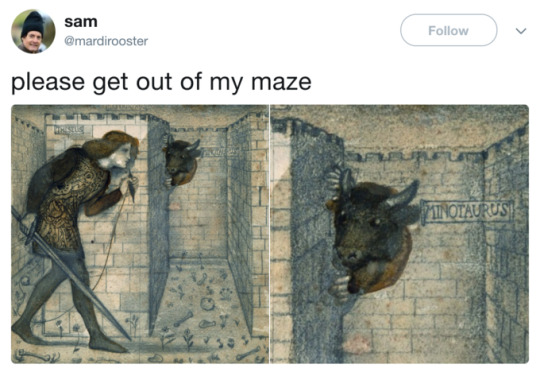
When the characters in the manga talk about dungeons, in Japanese they are actually using the word 迷宮 (meikyū) which means labyrinth. The connotation based on the kanji used is a palace or castle with many confusing rooms. The word “dungeon” (ダンジョン, danjon) is only every used in the manga’s title, when the narrator of the manga is referring to the title ("ahh Dungeon Meshi!"), or when Kui discusses dungoniums (ダンジョニウム/Danjoniumu) which she describes in the world guide as miniature dungeons, built to emulate a labyrinth.
The English loan word “dungeon” is most likely intended to catch Japanese reader’s eyes because it is foreign and exotic, and lead them into a false sense of security because of the Japanese pop culture perception of “dungeon” as a relatively harmless place where characters have formulaic adventures and gather resources as part of a game, or a game-like story.
“Dungeons” in Japanese pop culture can be sinister, but they have come to mean something as innocuous as “level” or “environment.” The early story of Dungeon Meshi is lighthearted and full of comedy, which reinforces this idea and leads readers to believe that the labyrinth in the story is just a generic backdrop with little inherent importance, like it is in many fantasy stories. However, Kui repeatedly suggests the labyrinth is not benign, that it is itself a monster and that anyone foolish enough to go into it is at risk of becoming food, and being devoured.
Before the word dungeon came to generically mean “place to exploit for resources” in fantasy fiction and gaming, its primary meaning was prison. So then the title “Dungeon Meshi” actually means “prison meal.” But who or what does the prison in Dungeon Meshi contain? Of all the people in the dungeon, who are the prisoners? And what does a “prison meal” really mean? A meal eaten by prisoners? A meal cooked by prisoners? A meal cooked using prisoners as ingredients? All of these meanings are implied and hinted at in the manga.
The characters in the story call the dungeon a labyrinth, which is a word that means a maze-like prison, specifically one that traps innocent young people and a man-eating monster inside. Both the monster and its food, the people, are prisoners… But which of them will die and be eaten? Who will escape the labyrinth in the end, and what will it cost them?
You’ll have to read Dungeon Meshi to find out!
======================
But so, you may ask, Mushroom, aside from all that stuff you just said, why does the dungeon/labyrinth distinction matter?
ARIADNE SPIDERS
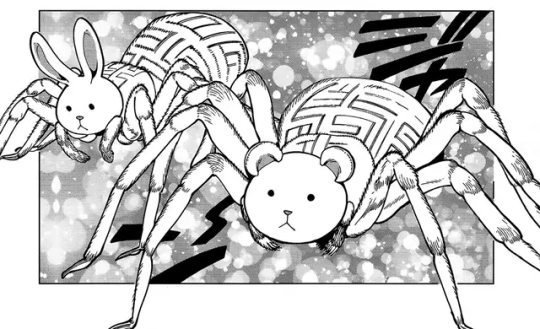
(Using the cute version here to protect anyone with arachnophobia)
These are giant spiders that the elves use to produce silk, which they use to make the armor the Canaries wear. Though we don’t know for sure, it’s likely the spiders are domesticated in order to make farming their silk easier.
Ariadne is the name of an Ancient Greek mythological character, and may be derived from the Ancient Cretan dialectical elements ari (ἀρι-) "most" (which is an intensive prefix) and adnós (ἀδνός) "holy", but the exact origins of the name are unknown. It may be pre-Greek and not from the Indo-European language family at all.
Ariadne was a princess of Crete that helped the hero Thesus escape from the maze/dungeon that contained the minotaur by giving Theseus a ball of magic thread.
The spiders in the manga have a pattern on their backs that looks like a maze, and their silk thread is the thing that protects the Canaries while they’re in the dungeon, and allows them to make it back out alive. The elves may consider the spiders “most holy” because they provide the means for them to protect themselves in battle.
Having the elves use a giant spider as a type of livestock might also be a playful reference to the drow (dark elves) of Dungeons & Dragons, since they worship a spider goddess, and Kui’s elves probably don’t worship the spiders if they’re using them as livestock… Though it’s also possible that they have a reverence for the spiders similar to the way cows are worshiped in parts of India, since some of elven culture appears to be based on South Asia!
THE CANARIES ARE BEING SACRIFICED TO THE DUNGEONS
Minos, Ariadne’s father, prayed to the God Poseidon to help him defeat his brothers and become king. He was sent a snow-white bull as a sign of the God’s favor. Minos was supposed to sacrifice the bull to Posiedon to show his gratitude, but because it was so beautiful Minos kept it, and sacrificed a different, inferior bull instead.
To punish Minos, Poseidon made Mino’s wife fall in love with the bull, which resulted in her mating with it and giving birth to a half-man, half-bull monster, a minotaur that could only survive by eating human flesh. King Minos constructed a labyrinth to hide the proof of his family’s shame and keep the minotaur trapped inside it.
In order to avoid war with King Minos, the people of Athens made a bargain, and every few years they sent 14 youths from their noble families to Minos as a sacrifice. These young men and women were sent into the labyrinth, where they became lost and trapped, and were eventually eaten by the minotaur. This continued until Ariadne fell in love with one of the Athenian youths, Theseus, and gave him a ball of magic thread which allowed him to kill the minotaur and escape the labyrinth.
There’s many ways this tale parallels the story of Dungeon Meshi. The ancients used the demon to accomplish their goals, and eventually their use of the demon’s power and their failure to control it led to them having to imprison the demon in a maze, and conceal its existence from the rest of the world. Now the elves, the descendants of the ancients, regularly “sacrifice” some of the children of their noble families to the dungeon, in an attempt to keep the demon from breaking free and destroying the world…
(This is an excerpt from my Dungeon Meshi essay.)
352 notes
·
View notes
Photo

Mycenaean Art
The Mycenaean civilization flourished in the late Bronze Age from the 15th to the 13th century BCE, and their artists would continue the traditions passed on to them from Minoan Crete. Pottery, frescoes, and goldwork skillfully depicted scenes from nature, religion, hunting, and war. Developing new forms and styles, Mycenaean Art would prove to be more ambitious in scale and range of materials than Cretan art and, with its progression towards more and more abstract imagery, go on to influence later Greek art in the Archaic and Classical periods.
Inspirations
The Mycenaean civilization was based on mainland Greece but ideas and materials came via trading contacts with other cultures across the Mediterranean. Imported materials included gold, ivory (principally from the Syrian elephant), copper, and glass, while in the other direction went Mycenaean goods such as pottery to places as far afield as Egypt, Mesopotamia, the Levant, Anatolia, Sicily, and Cyprus.
In art as expressed in fresco, pottery, and jewellery, the earlier Minoan culture on Crete greatly influenced Mycenaean art. The Minoan love of natural forms and flowing design especially was adopted by Mycenaean artisans but with a tendency to more schematic and less life-like representation. This new style would become the dominant one throughout the Mediterranean. Geometric designs were popular, too, as were decorative motifs such as spirals and rosettes. Pottery shapes are much like the Minoan with the notable additions of the goblet and the alabastron (squat jar) with a definite preference for large jars. Terracotta figurines of animals and especially standing female figures were popular, as were small sculptures in ivory, carved stone vessels, and intricate gold jewellery. Frescoes depicted plants, griffins, lions, bull-leaping, battle scenes, warriors, chariots, figure-of-eight shields, and boar hunts, a particularly popular Mycenaean activity.
Continue reading...
99 notes
·
View notes
Photo
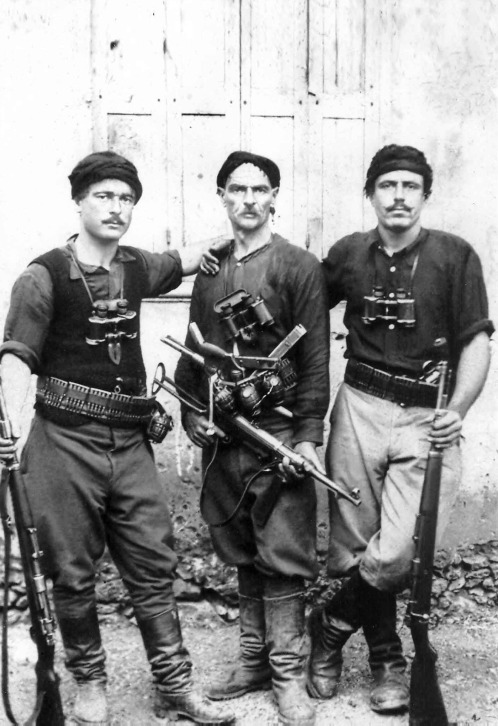
Greek anti-fascist partisans, Crete. 1941
89 notes
·
View notes
Text

German soldiers make their advance - The Battle of Crete 20 May - 1 June 1941
Credit : @justforbooks
#world war two#1940s#worldwar2photos#history#ww2#wwii#ww2 history#wwii era#world war 2#ww2history#battle of crete#invasion of Greece#greece#Crete#1941#wehrmacht
77 notes
·
View notes
Text

"The prominence of female divinity in Minoan culture might well have reflected the prominence of Minoan women in daily life. In Shang dynasty China, the authority of goddesses such as the Eastern and Western Mothers was echoed to some degree by the authority of women in elite society and even the army. Fu Jing and Fu Hao, wives of King Wu Ding, led men into battle before being honoured in death with monumental tombs containing the victims of human sacrifice, battle axes, knives and arrowheads. In Egypt, many of the images of Hatshepsut were destroyed or defaced after her death when her name was removed from the official list of rulers by her male successors, who sought to claim direct descent from her husband. It is possible that images of powerful Minoan women were subject to similar mistreatment.
While there is no evidence that Minoan women ruled in the same manner as Hatshepsut, or joined battle like the women of Shang China, the sheer number of artworks depicting them centrally placed and on a larger scale than men has prompted some historians to speculate that Minoan society was matriarchal or matrilineal. ‘Neopalatial Crete,’ writes one scholar, ‘presents the best candidate for a matriarchy – if one ever existed.’ There is nothing to say that the position of Minoan women was in any way secondary to that of men.
Minoan women were certainly not confined to the weaving room. Sculptures show them playing lyres, flutes and zithers, sashaying in flounced chevron-patterned skirts and raising their arms in the air in ecstasy. In the ‘Grandstand Fresco’ from Knossos the women are more carefully delineated in paint than the men. Each woman has her own identity, her own style. The women appear to occupy the main rooms of the palace while the men congregate as an anonymous mass beyond. Women depicted seated – a sign of divinity or authority – are often being approached by men or animals. A highly enigmatic fresco at Thera (Santorini), for example, features a woman wearing large hoop earrings, a snake in her hair, and a neck-chain of ducks, sitting on a dais with a griffin beside her while a blue monkey pays her court.
On a gold ring, a female deity, we may presume, is seated beneath a tree, where she receives flowers from two women. A smaller figure of a man with a double-headed axe over his head hovers between them. By depicting the man beneath the axe, and on a smaller scale than the women, the engraver of the ring perhaps hoped to convey that he was a divine vision, almost a thought-bubble, originating in one of the female worshipper’s heads. Trees, as Arthur Evans recognised, were sacred in Minoan culture, and were perhaps believed to be capable of inspiring divine visions in those who honoured them. Such artworks contribute to the picture of Minoan women exerting considerable religious authority in the palace complexes and society more widely.
Minoan women also played a crucial role in ritual. The early Minoans sometimes interred their dead twice by exhuming the bones of their family members and resettling them later in jars. The more usual custom, however, was to bury the dead in chamber tombs or stone beehive-shaped ‘tholos’ tombs, clay sarcophagi or, in the case of infants, under the floorboards of the home. The colourful paintings on a rare limestone sarcophagus from Hagia Triada, circa 1400 bc, show three men carrying young animals and a model boat to the deceased, who stands in front of his tomb, ready to receive his provisions for the afterlife. There are also three women present, the first of whom pours a libation into a cauldron placed between two upright axes mounted by birds; the second carries further vessels; the third – darker skinned like the men and thus possibly of lower social status – has a lyre. On the other side of the sarcophagus the women assist in the sacrifice of a bull on an altar. Other wall paintings show women involved in rituals of their own involving blood. A fresco from Akrotiri features a group of women, one of whom sits beside a sunken room or ‘lustral basin’ with a bleeding foot. A tree also bleeds. It is possible that lustral basins were used for purification by women during or after menstruation."
The Missing Thread: A Women's History of the Ancient World, Daisy Dunn
#history#women in history#women's history#historyedit#minoan women#minoan civilization#bronze age#crete#knossos#ancient history#ancient world#powerful women#historical figures
151 notes
·
View notes
Text
How much stuff from the Homer should we keep in our vision of the Trojan War story?
Do we keep everything Iliadic and Odyssean here? Do we retain every event, every detail, despite the fact that some of them contradict other traditions? Or should we change something to adapt other accounts, or should we try to find a reconciliation in-between?
Do we omit Palamedes in our telling of the recruitment of Odysseus so the ones being rude were just the Atreïda, or do we go with the Cypria as well as other sources where Odysseus faked his madness and got exposed by Palamedes?
Do we have Achilles and Patroclus in Phthia joining the war eagerly, or do we have Odysseus using the trick to find out Achilles in disguise hiding in Skyros?
Do we have Achilles leading the Achaeans to plunder around before reaching Troy, or do we have a storm scattering the fleet so that each king returned to his own kingdom while Achilles came to Skyros and married Deïdameia there?
Do we have Achilles being able to bleed in battle, or do we make him invincible other than his infamous heels?
Do we have Astyanax as Hector’s only son, or do we allow the existence of another son—Laodamas—to live even longer by his mother’s side?
Do we have Anticleia dying of mostly old age and sadness, or do we have Nauplius bringing false news to Anticleia, causing her to hang herself?
Do we hold Aegisthus responsible for the seduction of Clytemnestra and the death of Agamemnon and Cassandra, or do we have Clytemnestra orchestrating it, and give her an axe to deal the death blow?
Do we have other Achaeans returning and staying home safe from war and sea, or do we have the most of them wandering still to found many cities in places like Italy?
Do we find Neoptolemus staying in Phthia waiting to marry Hermione, or do we see him reigning over in Epirus?
Do we know Aegialeia as the faithful wife who’d tear for her husband in her empty bed, or do we see her as the queen who betrayed her king upon his return, for reasons up to interpretation?
Do we have Diomedes reaching home safe and sound, or do we need him exiled to Italy so he could start founding cities?
Do we keep Odysseus’s journey in mythical islands and seas, or do we have him wandering in Italy (even to Iberia) like others, founding cities and leaving some tombs of his crewmates behind?
Do we agree that the Telemachy took place in Pylos and Sparta, or do we find Telemachus going to Crete to see Idomeneus?
Do we follow Homer’s claim that Odysseus’s lineage was a line of single sons, or do we consider Telemachus’s statement here merely dramatic thus allowing all those other “sons of Odysseus” to exist?
Do we agree that there were no Nausithous or Nausinous, or do we have Odysseus leaving them both behind on Ogygia forever?
Do we know Penelope as the loyal wife that she was, or do we find her consorting with one or more suitors resulting in the birth of Pan?
Do we have Odysseus and Penelope reuniting by each other’s side at last, or do we see Odysseus exiling Penelope because of her “disloyalty”, so that she wandered in Lacedaemonia and Arcadia to Mantineia where she finally died?
Do we have Athena and Zeus intervening in the fight between Odysseus’s household and the suitors’ family to establish an everlasting peace, or do we leave this matter to Neoptolemus’s hands just to see Odysseus exiled?
Do we make him finish his oar quest and return immediately, or do we keep him in Thesprotia where he marries another woman and had another son and fought another war and returned again?
Do we agree that Telegonus wouldn’t exist, or do we have him stabbing Odysseus marrying Penelope giving his mother Circe to Telemachus to wed?
Do we give Odysseus a peaceful death from the sea, or do we not?
#we love Homer—to what extent? Which detail would you keep in your head and which one would you not?#these are just questions; and I’m curious to hear yall’s answers#you can find all of these in different ancient sources btw#tagamemnon#greek mythology#the iliad#the odyssey#homer’s iliad#homer’s odyssey#the epic cycle#trojan war#lyculī quaestiōnēs#achilles#odysseus#penelope#aegialea#diomedes#clytemnestra#idomeneus
64 notes
·
View notes
Text
some characters from Greek mythology

Welchanos - a young god of vegetation and fertility in Crete. Welchanos was associated with agrarian magic, with the vegetation cycle and seasonal death, and with the rebirth of nature.
Xanthus - an immortal horse. Achilles' charioteer Automedon once chided Xanthus and Balius for leaving Patroclus behind on the battle field and would that they did not leave behind Achilles as well. Xanthus, given the ability of speech by Hera, turned its head reproachfully and told Achilles that this time they would save him but that his day of doom was nigh, by the decree of inexorable destiny, which also caused Patroclus' death.
Xenodice - "Fair to Strangers." Heracles killed her along with her father. She fell in love with Heracles, but died of grief because she could not be his. When Heracles came to her funeral he had to be restrained from throwing himself on her funeral pyre.
Zacynthus - the first man to sail across to the island to establish a colony.
Zetes - along with his brother, Calais, are called the Boreades, and are generally described as winged beings, though some say that they had wings at their heads and feet, and others that they had them only at their feet, or at their shoulders.
#writing prompt#greek mythology#dark academia#light academia#writeblr#spilled ink#studyblr#literature#poets on tumblr#writers on tumblr#title prompt#name ideas#writing inspo#writing inspiration#writing ideas#writing reference#frederic edwin church#nature#writing resources
91 notes
·
View notes
Text

Of course, we already have an established image of Pyrrha in Ever after, but I wanted to make my own version of the armor for her. And yes, I took Malenia's helmet, but the armor itself was inspired by Ornstein from Dark souls. And since she no longer has a Spartan motif, she is now a Bronze Guardian, which is a reference to Talos - a bronze automaton that guarded the island of Crete, which had a weakness in the form of a nail in the ankle. And as for the story of this Pyrrha, during the battle on the Bacon tower, Jaune flew in on a locker there and managed to detain Cinder long enough for Ruby to arrive, but unfortunately Jaune himself did not survive. After Pyrrha goes through her journey with NPR and RWBY, but in the Atlas Pyrrha manages to detain Cinder and Neo on the bridge and transfer the relics to the Vacuum, and she falls into Everafter and plucks the clock fruit, after which she meets Jaune from the original timeline.
The idea of time lines that fit on top of each other in Everafter was taken from the same Dark souls, where, as in Everafter, time twists into a spiral, which is why the same events can intertwine into a knot, and people from different eras are able to meet.
258 notes
·
View notes